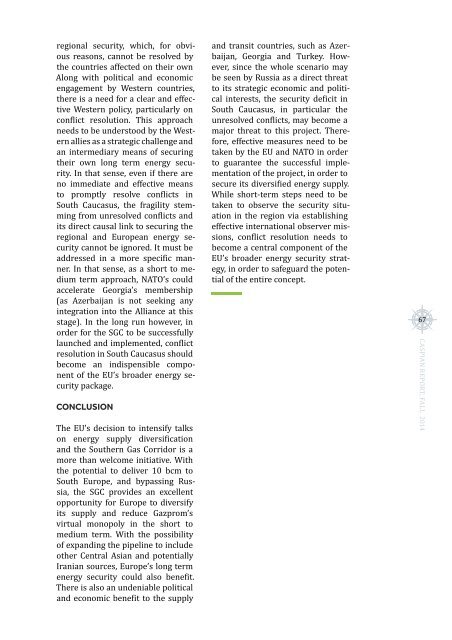Create successful ePaper yourself
Turn your PDF publications into a flip-book with our unique Google optimized e-Paper software.
egional security, which, for obvious<br />
reasons, cannot be resolved by<br />
the countries affected on their own<br />
Along with political and economic<br />
engagement by Western countries,<br />
there is a need for a clear and effective<br />
Western policy, particularly on<br />
conflict resolution. This approach<br />
needs to be understood by the Western<br />
allies as a strategic challenge and<br />
an intermediary means of securing<br />
their own long term energy security.<br />
In that sense, even if there are<br />
no immediate and effective means<br />
to promptly resolve conflicts in<br />
South Caucasus, the fragility stemming<br />
from unresolved conflicts and<br />
its direct causal link to securing the<br />
regional and European energy security<br />
cannot be ignored. It must be<br />
addressed in a more specific manner.<br />
In that sense, as a short to medium<br />
term approach, NATO’s could<br />
accelerate Georgia’s membership<br />
(as Azerbaijan is not seeking any<br />
integration into the Alliance at this<br />
stage). In the long run however, in<br />
order for the SGC to be successfully<br />
launched and implemented, conflict<br />
resolution in South Caucasus should<br />
become an indispensible component<br />
of the EU’s broader energy security<br />
package.<br />
CONCLUSION<br />
The EU’s decision to intensify talks<br />
on energy supply diversification<br />
and the Southern Gas Corridor is a<br />
more than welcome initiative. With<br />
the potential to deliver 10 bcm to<br />
South Europe, and bypassing Russia,<br />
the SGC provides an excellent<br />
opportunity for Europe to diversify<br />
its supply and reduce Gazprom’s<br />
virtual monopoly in the short to<br />
medium term. With the possibility<br />
of expanding the pipeline to include<br />
other Central Asian and potentially<br />
Iranian sources, Europe’s long term<br />
energy security could also benefit.<br />
There is also an undeniable political<br />
and economic benefit to the supply<br />
and transit countries, such as Azerbaijan,<br />
Georgia and Turkey. However,<br />
since the whole scenario may<br />
be seen by Russia as a direct threat<br />
to its strategic economic and political<br />
interests, the security deficit in<br />
South Caucasus, in particular the<br />
unresolved conflicts, may become a<br />
major threat to this project. Therefore,<br />
effective measures need to be<br />
taken by the EU and NATO in order<br />
to guarantee the successful implementation<br />
of the project, in order to<br />
secure its diversified energy supply.<br />
While short-term steps need to be<br />
taken to observe the security situation<br />
in the region via establishing<br />
effective international observer missions,<br />
conflict resolution needs to<br />
become a central component of the<br />
EU’s broader energy security strategy,<br />
in order to safeguard the potential<br />
of the entire concept.<br />
67<br />
CASPIAN REPORT, FALL <strong>2014</strong>










